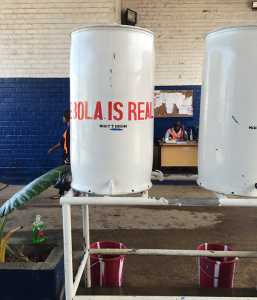Handwashing & Ebola Factsheet
Published: January 29, 2015

Ebola virus disease is a severe acute viral disease that can spread from animal to human or from human to human, both through direct contact with an infected person or animal’s bodily fluids, or through contact with materials that have been contaminated with these infected bodily fluids. As many as nine out of every ten people who are infected with Ebola virus can die from the disease; in the current outbreak, the average fatality rate is around 50%.
For more information about Ebola virus disease, please refer to the World Health Organization factsheet and FAQs and to the WHO/UNICEF questions and answers regarding water, sanitation and hygiene.
For any infection that is transmitted through human to human contact involving bodily fluids, handwashing with soap after any contact (or potential contact) with body fluids is one method to help protect yourself and others from infection.
“Handwashing protection works by washing the infection-causing germs off your hands before they get a chance to infect you, and before you accidentally touch things that could help spread these infection-causing germs to other people,” says Dr Layla McCay, Secretariat Director of the PPPHW. “Wet your hands with water, lather with soap for 20 seconds, rinse with running water, and shake your hands dry. Remember: infection-causing germs are too small to see with the naked eye, so you should wash your hands after any possible exposure.”
Handwashing with soap is an important method for protecting yourself and your community from the spread of Ebola virus. Since there has not yet been enough research on Ebola and handwashing, the following handwashing advice is based on the best available evidence and expertise available at present, and may change as more research is conducted and more evidence becomes available.
Ebola response teams are working to reach affected and at-risk communities and households with key messages on how to properly wash their hands. As such, behavior change communication is particularly important. The Ebola Communication Network is one resource that provides tools for those working on Ebola behavior change communication efforts; this article is particularly useful.
TAGS: Advocacy MaterialsTrainings & ToolkitsPartnership Documents Handwashing and Sanitation ImplementersPolicy MakersGeneral PublicAcademicsEducatorsAdvocates 2014